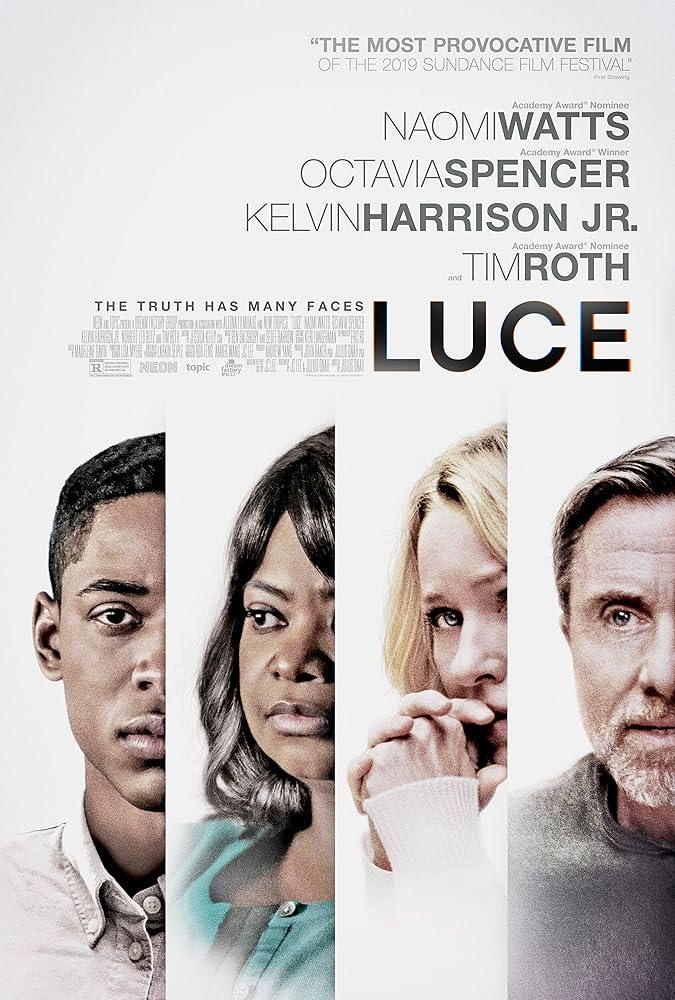
If you watched a lot of
network television in the 80’s and 90’s, then you’re probably familiar with a
concept called the “Very Special Episode”, where a normally lighthearted show (usually
family sitcoms) would take an abruptly serious tone shift in order to teach the
audience a lesson about serious topics like drug and alcohol abuse, stranger
danger, racism and even sexual assault. They’re not nearly as common as they once
were, mostly because they’ve been the subject of ridicule for trying to offer
concise, clean-cut solutions to complicated subject matter with no easy answer.
It’s precisely because of this that Luce, a psychodrama that tackles a
myriad of complex topics but offers no simple solutions, feels so refreshing.
Our story follows Luce (Kelvin
Harrison Jr.), a black teenager who was raised as a child soldier in a war-torn
African nation, but is given a new lease on life after he’s adopted by a white
couple (Naomi Watts and Tim Roth) and brought to America. Since then, he’s completely
turned his life around. He’s a star athlete, a model student, and is beloved by
peers and teachers alike. But one day, his history teacher Harriet (Octavia
Spencer) makes a horrifying discovery. He writes a paper advocating for
violence against political opponents, and to make matters worse, a bag full of
illegal fireworks are found in his locker. Luce’s parents are understandably in
denial and do everything they can to defend him, which becomes harder as more evidence
comes pouring in and the already antagonistic relationship between Luce and
Harriet becomes more hostile.
To say this film is topical
would be underselling it. In a time where America suffers a mass shooting
nearly every day, often telegraphed by the shooter writing a manifesto
declaring its radical worldview, and the tightening scrutiny of black people by
the police, it’s hard not to see why a film like this would need to be made.
Director Julian Onah, who rebounds here after his career got off to a rocky
start with The Cloverfield Paradox, provides an uncomfortably real
situation to life where there are no easy answers, no easy solutions, and no
one is exactly who they say they are.
In the paper that sets the
plot in motion, Luce writes in the voice of Frantz Fanon, a pan-African philosopher
who famously argued that violence was a necessary component in the fight
against tyranny. This understandably sets off a few alarm bells, and combined
with his troubled upbringing, makes him look like a radical in the making. But
aside from Harriet, the rest of the faculty is less eager to put the screws on
him since he’s become a poster boy for the school’s successes, and don’t want
to tarnish that reputation. While Luce repeatedly insists that he’s innocent, there
was always tension between him and Harriet, who has a take-no-prisoners approach
to teaching her students about the propensity of tokenism by singling certain
students out for not living up to her expectations. This has led to a female
student being outed after she was sexually assaulted at a party, and a
promising young athlete getting kicked off the track team and having his chance
at a college scholarship jeopardized for smoking weed. (Not coincidentally,
both students are minorities.) Likewise, Luce’s parent’s end up in a similar
nature vs. nurture conflict since the onus is on them to raise him right.
Understandably defensive of their son at first, as the evidence against him
piles up, they start to question if there was anything they even could
do.
But while the adults are busy
pointing fingers at each other, Luce is under the pressure of both this scandal
and everyone’s colossal expectations of him. But rather than cracking, he feels
somewhat content into slipping into the roles forced onto him. Performances are
excellent all around, and while that’s expected when you have the likes of
Watts, Roth and Spencer in your cast, it’s Kelvin Harrison Jr. who ends up
leaving the most lasting impression. Able to switch between coding on a dime,
he slips into the roles of son, student, friend and adversary with nary a
hitch, all while maintaining a sinister congeniality that never quite gives
away what’s going on in this character’s head. At once frustrated by the
various boxes his parents, teachers, and society try to force him in, hungry to
right perceived injustices, and maybe a little too eager to exact revenge on
those who put him in this conundrum, Luce remains an enigma, a question mark trying
to straighten himself into an exclamation point.
At the end of the day, Luce
feels more like a film that’s meant to be discussed than enjoyed. That
persistent vagueness may be a sticking point for some looking for clear cut
answers, but if there is any lesson to take away from this, it’s that there
aren’t always clear-cut answers, defined good guys or bad guys for us to extract
catharsis from. This ambiguity will probably be the defining factor that’ll
make this movie relieving or maddening for the audience, but it’s a necessary
one nevertheless.
8/10
No comments:
Post a Comment